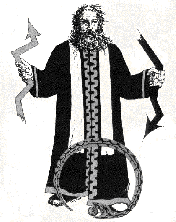The Listening Attention | home

Gateway to Within | Tricks and Traps | About Us | Writings | Writings 2 | Links | Humor | Quotes | Books
Tricks and Traps
Tricks and Traps is designed to befuddle the ego and perhaps bring back the lost art of direct perception. The present age puts great emphasis on the personality or little man at the expense of the opportunity of seeing who we really are. The little man is not a problem to be improved or solved but simply something to get behind or above. He or she has enough problems already without adding spiritual perfection to the list, now don't you?
The Tricks are simple little tools by which you leave the conceptual mind aside and take a look directly at yourself and your world.
The Traps are to expose the many ways we fool ourselves and are robbed of the ability to see directly and clearly, without concepts.
Be careful, using these tools can be quite dangerous. They're pointy little devils and prickly to the ego.
Only children at heart can safely handle them.
As individual points of awareness, our chief feature is one of identifying. We become whatever we stare at long enough, and we have been looking at the body/mind since birth. This hypnosis is so strong, most of us cannot escape it without help. The ego, being the clever, self-righteous fool that it is, will not let us accept this help, so we have to be tricked. Fortunately, the Powers That Be invented some very useful tricks to help us out. All tricks are for destroying the ego-centric fantasy that we actually exist, as the body/mind or anything else for that matter, and for freeing us from believing that there is such a thing as an individual 'self '. They serve to back the awareness out of the individual mind/memory and into the state of universal awareness, away from self into silent witness. Thus, a retreat or dis-identification from the mind and its projections is caused, hopefully leading to the realization of one's true self: the observer. Here's a few tricks to get you going but remember, . . . they won't work if you actually believe any of this.
Trap: taking oneself too seriously. Too often in spiritual work, we fall for the trap of the spiritual ego and begin to believe in our own infallibility. We treat others as inferior beings, and can't understand why we are still subject to cause and effect. Being serious seekers on the righteous path of truth, why won't everything and everybody just shape up or leave us alone, do what we want or get out of our way? To escape this self-indulgent trap we can use the following
Trick: taking the Work personally. If we have fallen into the trap of thinking that spiritual work is about correcting the world and its inhabitants so as to bring them around to our superior way of thinking, we have forgotten an important thing; it is our very idea of ourselves that must change, not the world. We can start looking at the log in our eye and not the mote in our fellow's. Self-observation can give us a healthy dose of humility, helping us to see ourselves and others in a clearer light. Now that we've avoided trying to make the world fit our ego, we're in danger of falling for the
Trap: taking the Work too personally. Here, we may think that self-observation means judging ourselves rather than others, and now try to make our ego fit the world. To escape this self-indulgent trap we can use the following
Trick: learning what self-observation really is. We listen instead of assume and project, we discern instead of judge. We strive to see that the world of our imagination is not always an exact match for the world of perception, and if we're lucky, the next time we look in the mirror we'll have a good laugh, having come to see a bit clearer one more of the many ways we fool ourselves.

Trap: This one's for all you jaded seekers, so you neophytes, beware. How much value do you place on your self-image as a seeker? Is your pride mainly centered on your spiritual progress? Do you see everything in hierarchies of spiritual attainment? Feel spiritually superior, and like it? Well, here's the trap of the spiritual ego. You cannot keep getting better and better for ever, someday you'll have to finally get well.
Trap: Armchair Travelers Grandiosity - How many times have you noticed others (and yourself!) talking confidently about something they have no real experience with. It's easy to live in the imagination, where there is no real resistance, and to 'think' we know things we don't. Don't go about the spiritual search from the 'safety' of a fantasy land. Armchair travelers reap words, not truth. We can hide in a dream or face our fears, acknowledge our inexperience, and pray we're taught what we need to know.

Trap: One of the most common traps is that of complacency. We reach a plateau in our life, often through hard work, where we are somewhat financially safe and have a relatively secure position in life. This is called in self-help world, The Comfort Zone. We hear that earnestness is the prime necessity for progress along the spiritual path, and while our intuition may tell us this is true, we find we have no burning drive, or time. Our funds are all tapped, so to speak, and we have no room for the Work in our comfort. How does one break out of this trap? Honesty in self-knowledge. Ask yourself, what do you really want? Then, why are you not going about getting it? What's stopping you, or are you living by habit alone, safe in sleep? Are you trapped by circumstance, or by your own lack of clarity as to your true desire?
Trap: Visualizing the thought of 'now' and projecting it to the exclusion of all other thoughts, and believing this to be the actual present moment, or 'being in the now'. This mistaking of a projected memory for the 'now' simply leads to frustration as it soon collapses and leaves one worse than before, forcing a new round of projection as the circle of mind, memory, and imagination continues to spin.
Trap: One of the first things that listening can show us, is that much of what we think we hear is our own voice, or thought-projections. We're like a dog chasing its tail: we create a thought or judgement and then begin to chase it, thinking that we've seen something real or objective. When we listen attentively to ourselves, we detach from this self-made mind-chatter, the tail disappears, the circle of creation, projection, and reaction is broken, and we are left in peace, able to receive.
Trap: Being spiritually 'picky'. Another form of grandiosity or pride, many of us turn up our noses at the very things or people that could help us the most. Feeling that only the most advanced teaching or master, and only the most exciting or trendiest techniques, are the only ones for us, we ignore our own intuition, and pass over many of the obstacles or blocks that need our attention.
Trap: Placing faith in information, rather than understanding: We may have valuable insights from dreams, books, and teachers, though possibly forming and catering to an ego around them. Realize, in your waking day-to-day life, what you've seen in dreams and books. Relate the intellectual information to the associated pattern in everyday life. This is the test of whether the information has turned to true understanding, rather than ego-fantasy.
copyright 2006 by Robert Fergeson